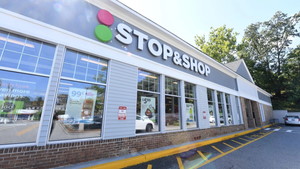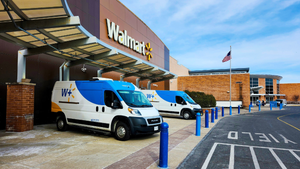THE SUPERCENTER JUGGERNAUT 1995-07-24 (1)THE SUPERCENTER JUGGERNAUT 1995-07-24 (1)
MEXICO CITY -- In the race to export its retail presence beyond the U.S. borders, Wal-Mart Stores is ahead of rival Kmart Corp.But Troy, Mich.-based Kmart continues to push ahead with its concepts internationally. A prime area to watch is Mexico, where Wal-Mart already operates 96 stores -- including 63 conventional discount stores, 11 supercenters and 22 Sam's Clubs -- since joining forces three
July 24, 1995
JOANNA RAMEY
MEXICO CITY -- In the race to export its retail presence beyond the U.S. borders, Wal-Mart Stores is ahead of rival Kmart Corp.
But Troy, Mich.-based Kmart continues to push ahead with its concepts internationally. A prime area to watch is Mexico, where Wal-Mart already operates 96 stores -- including 63 conventional discount stores, 11 supercenters and 22 Sam's Clubs -- since joining forces three years ago with Mexican discount king Cifra. In contrast, Kmart only operates four stores in that country, all of them supercenters.
Nevertheless, Kmart views its Mexican operation as its Latin American laboratory: a stepping stone for an entry into Central and South America.
With "everything we've done, we've had that in the back of our minds," said Frank Cardinal, chief operating officer of Kmart's joint venture here with Mexican department store chain Liverpool, in an interview with SN.
Kmart's four Mexican supercenters, located in far-reaching Mexico City suburbs, are making an operating profit, although the initial start-up investment is still to be recovered and plans to roll out 35 to 40 additional stores of various formats nationwide are on hold because of the country's economic crisis, Cardinal said.
"The economic problems could last another six months, or they could last another three years," Cardinal said. Regardless, he says, Mexico is still viewed as an important market to the Kmart joint-venture partners.
Wal-Mart, based in Bentonville, Ark., also has been rethinking its plans in Mexico. While it got an early start with its joint venture, it, too, has put expansion plans of some 30 stores on hold, including discount stores and alternative formats.
Wall Street analysts estimate Kmart has about $100 million invested thus far in the joint venture. Like its supercenter sisters in the United States, Kmart Mexico finds that grocery sales are key to the supercenter's performance, amounting to about 50% of total sales and about half of the store's space. The supermarket side of the business in most respects is identical to Kmart's in the United States, save for important details designed to customize the operation to Mexican tastes and shoppers of varying incomes.
Analysts point out that Kmart's small presence here doesn't have much profit value for now beyond that of experimentation. Some also question Kmart's commitment to major international expansion, with new U.S. Kmart management having just come into place. Floyd Hall was recently named president and chief executive officer of Kmart.
"Kmart in Mexico is just not big enough to amount to a hill of beans for Liverpool or Kmart, positive or negative," said Susan Engel, a Latin America retail analyst for Nomura Securities, New York.
"It's minuscule," says Michael Exstein, a retail analyst with PaineWebber, New York. "The business would have to be grown substantially to amount to anything. Mexico was part of a grander vision of Kmart from several years ago."
Nevertheless, Cardinal, 27 years with Kmart U.S. and previously the chain's regional manager in Texas, and his partner, Liverpool Chief Executive Officer Juan Suberville, who has had 25 years experience with Liverpool, are confident they'll make a go of it.
Suberville said one major challenge is the scarcity and high price tag for choice spots to put 165,000-square-foot supercenters. In choosing locations, Kmart has sought to distinguish itself by pinpointing isolated, off-the-beaten-path tracks, instead of clogged highways already dotted with competitors.
Although it just has four stores, Kmart Mexico is working on having an image of a big player. In the Mexican tradition of retailers staking out one day of the week as their own for promotions, Kmart has laid claim to Tuesdays, even though, by a long-standing gentleman's agreement, that day had already been staked out by the grocery and mass merchandise chain Gigante.
In the promotions, Kmart uses the catchy coinage, "K-martes," a play on the Spanish word for Tuesday, which is liberally advertised on radio and in in-store fliers. The slogan touts: "K-martes, la kalidad al precio que quiere," or K-martes, the quality at the price you want.
Store officials also are honing their skills at keeping costs down. For example, government-controlled raw material prices, such as plastic resins used in making bags, are scrutinized to ensure that manufacturers of finished products aren't price gouging. The buying clout of Kmart's 2,200 U.S. stores is being wielded to squeeze the lowest price from suppliers. Whenever possible, the chain also relies on suppliers to import merchandise themselves.
"We let the others do the work for us. That way we don't build up the stock. It was such a simple solution. Now Wal-Mart is going that way. They now see what the problem is. Thank God we started out that way," Cardinal said. Kmart Mexico only directly imports 20% of its foreign-made merchandise.
Another cost saver: Kmart Mexico's work force of 2,300 is also augmented daily by 200 to 250 manufacturer reps who come into the stores free of charge to fill counters, place reorders and wait on customers. The concept of having independent manufacturer representatives or deliveries made to a Kmart distribution center also isn't needed. On any given day, 170 trucks make deliveries directly to each Kmart Mexico store, regardless of the order size. "It's the damndest thing I have ever seen, but it works," Cardinal said.
Kmart has worked hard to gear merchandise to local tastes. For example, a "tortilleria" churns out bundles of fresh tortillas by the hour that are priced at 13 cents for 2 pounds, according to government-controlled levels designated for certain staples. Likewise, the expansive bakery department sells the national bread, known as "bolillo," a 6-inch crusty loaf that is government-priced just under 2 cents. On a given day, a store baker, with the help of a special conveyor-belt machine, turns out 1,800 loaves an hour.
"It's gone every day," said Suberville of the store's entire baked goods selection. Like at other Mexican "autoservicios," or self-service grocery stores, customers select bread with tongs, placing their entire order on a metal pizza tray before taking it
to a bakery cashier for bagging and pricing.
At a recent visit to Kmart's San Mateo store north of Mexico City, the bakery and nearby "salchichoneria," or delicatessen, were busy at 7 p.m. (the store is open until 10 p.m.). In addition to a variety of Mexican meats, the case was well stocked with imported meats, such as hams from Switzerland, Spain and France. The meat department, too, is steeped in variety. Each store has 60 half cows on the hoof delivered biweekly, which keep about three dozen butchers busy filling cut-to-order requests. The store also offers precut meat.
Prepared food, a popular fixture in Mexican supermarkets, is prominently featured at Kmart, where a salad and entree bar has 30 selections and a separate seafood bar offers about a dozen dishes, including ceviche, trout patties and prepared salmon. For holidays, gourmet-quality meals are available for advanced orders.
"On Saturdays and Sundays, people line up like at the movies, getting prepared food so they don't have to cook," Cardinal said.
About 99% of all food and health and beauty care products and cosmetics are Mexican-made, including most leading U.S. brands, such as Lipton, Nestle and Campbell Soup. Sourcing locally is particularly helpful to businesses like Kmart in economic downturns, since domestically produced goods can be less than half the price of imports. In addition to imported meats, other foreign-produced goods include such things as semisweet chocolate chips used in cookies or Folgers coffee.
While Cardinal and Suberville declined to give Kmart Mexico's sales, analysts concur the sale of food is the life preserver for mass merchandisers in the current Mexican economy. They forecast sales for discount/grocery stores in 1995 to be flat or to decline 5% as a group compared with 1994. Sale at department stores are expected to decline 15%.
About the Author
You May Also Like




